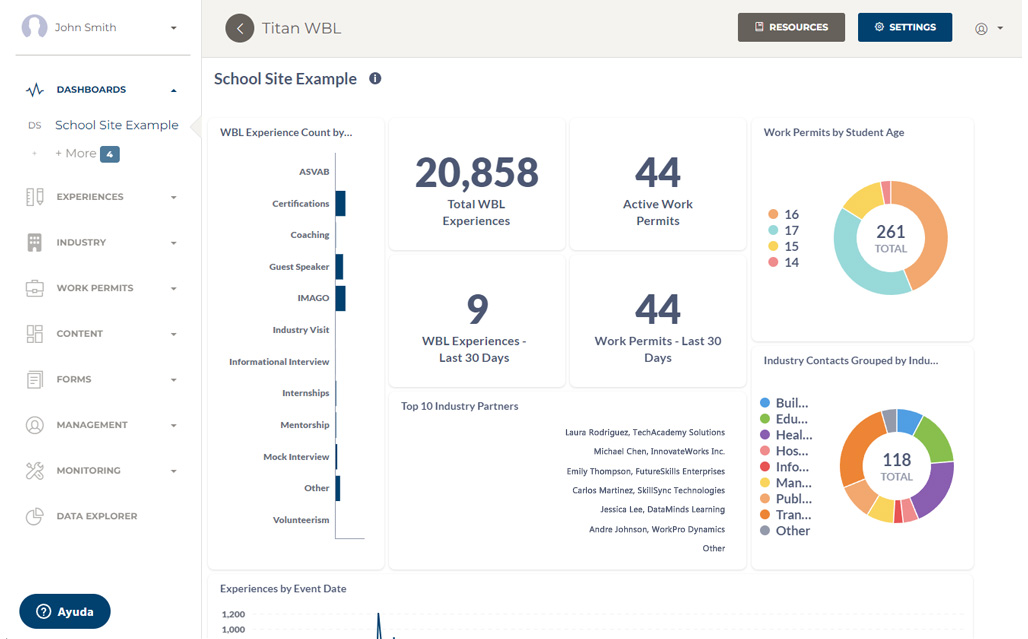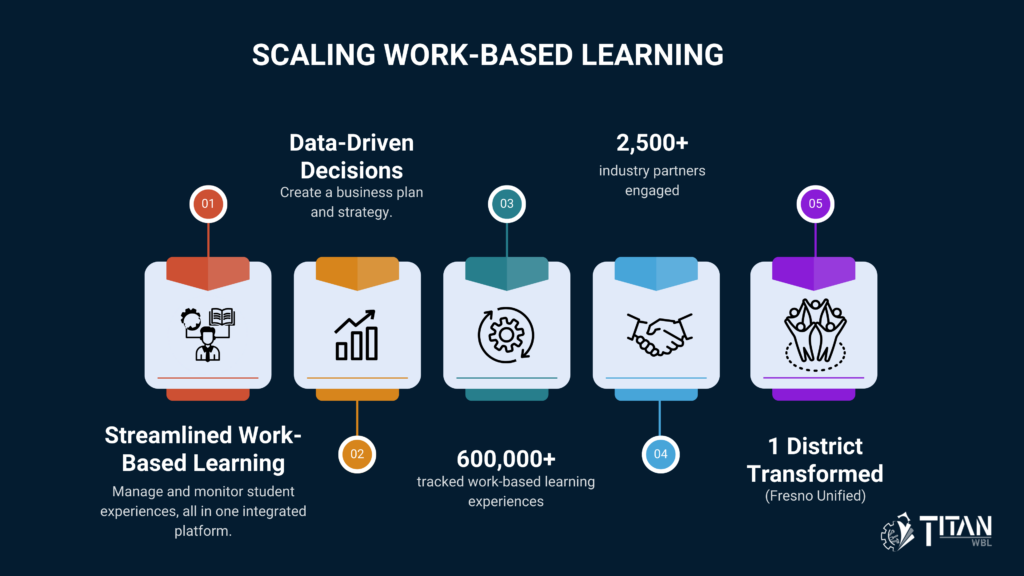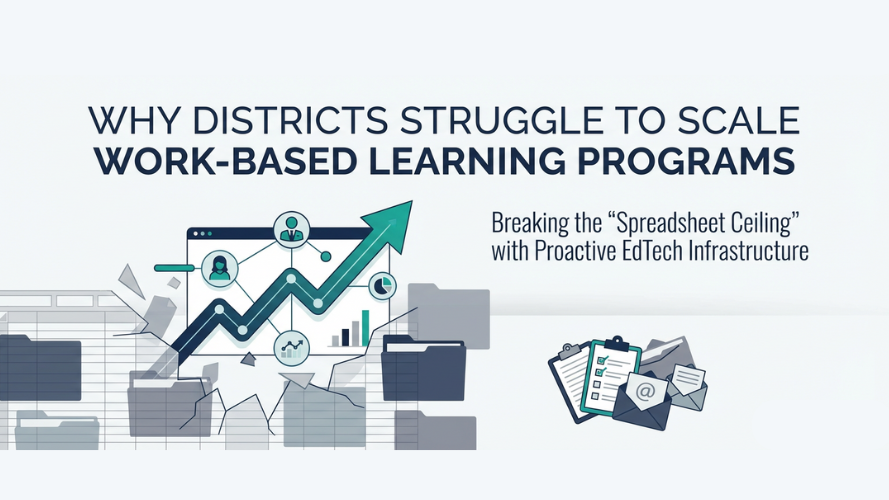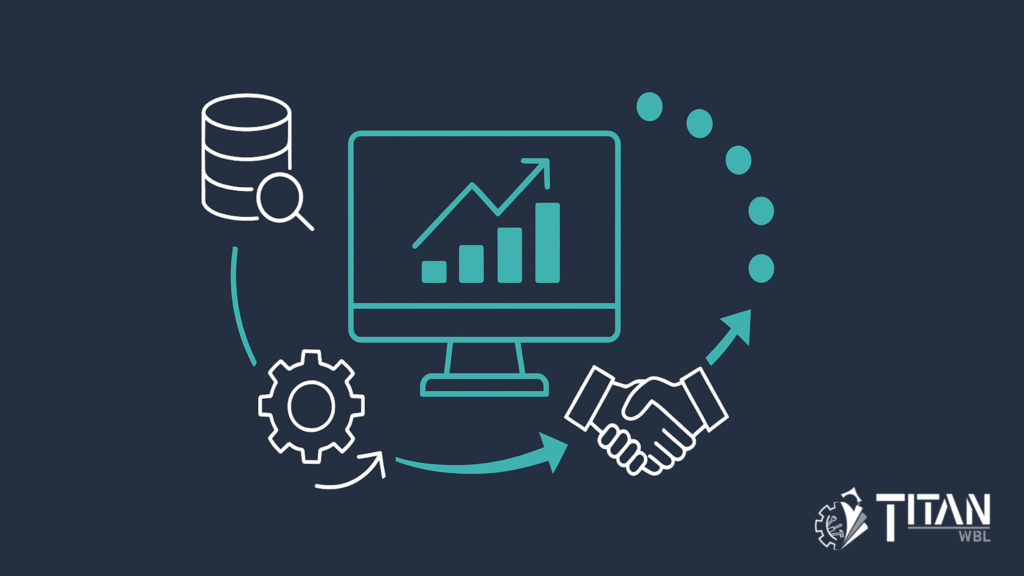Introduction
When it comes to Career and Technical Education (CTE) and Work-Based Learning (WBL), districts face a shared challenge: how to manage scale without losing quality. Fresno Unified School District (FUSD) offers a powerful case study in what is possible when the right systems are in place. By implementing TitanWBL, Fresno scaled to over 600,000 Work-Based Learning experiences and 2,500+ industry partners, all while maintaining compliance, saving staff time, and ensuring equity across 50+ CTE programs.
This Work-Based Learning case study shows districts that scaling is not just about doing more; it is about doing it smarter. Let’s explore how Fresno made it happen and what lessons every district can take away.
Why Scaling Work-Based Learning Is Hard
Before Fresno Unified’s transformation, Work-Based Learning coordinators everywhere shared familiar pain points:
- Data chaos: Multiple spreadsheets spread across schools, each with conflicting or incomplete information.
- Compliance risk: Hours spent manually cleaning data for state and federal reporting, with high potential for errors.
- Equity gaps: Difficulty tracking which students were missing opportunities.
- Limited partnerships: No clear system to manage industry relationships at scale.
For a district as large as Fresno, these problems multiplied. With tens of thousands of students and dozens of CTE pathways, spreadsheets were simply not sustainable.
Fresno Unified’s Turning Point
Fresno USD needed a system that could:
- Centralize Work-Based Learning data across all programs.
- Support compliance reporting without draining staff time.
- Scale industry partnerships while maintaining quality.
- Ensure equity tracking to meet districtwide goals.
They turned to TitanWBL, an all-in-one platform designed specifically for K–12 Work-Based Learning programs.
Implementation: Fast and Scalable
Unlike many large software rollouts, Fresno’s transition was fast:
- Deployment Time: District-wide rollout in under 3 weeks.
- Ease of Use: Internal capability in as little as 1 week.
- Adoption: Career readiness directors, coordinators, and teachers quickly adapted to role-based dashboards and reporting tools.
This rapid implementation meant Fresno could start reaping benefits almost immediately.
Results: 600,000+ Experiences, 2,500+ Partners
Fresno USD’s outcomes speak for themselves:
- 600,000+ Work-Based Learning experiences tracked accurately and efficiently.
- 2,500+ industry partners engaged and maintained at scale.
- 50+ CTE programs supported with consistent data and insights.
These results demonstrate that scaling is not just about volume, it is about creating sustainable systems that serve students, staff, and partners alike.
Key Features That Made the Difference
Centralized Tracking
TitanWBL eliminated data silos by consolidating student, staff, and partner information in one secure, FERPA-compliant system.
Compliance-Ready Dashboards
With automated compliance reporting, Fresno saved staff hundreds of hours each year and reduced the risk of costly errors.
Equity Insights
Dashboards gave Fresno visibility into student participation by demographics, ensuring that underrepresented groups were not left behind.
Automation and Time Savings
Features like Clever SIS sync, digital work permits, and custom dashboards streamlined previously manual processes.
Scalable Partnership Management
TitanWBL’s industry partner management tools allowed Fresno to sustain relationships with thousands of partners without overwhelming staff.
Lessons for Other Districts
1. Do Not Wait Until Spreadsheets Break
Even smaller districts will eventually hit a breaking point. Transitioning early prevents crisis-driven change.
2. Equity Requires Data
If you cannot disaggregate student participation data, you cannot ensure equity. Centralized dashboards make this possible.
3. Compliance Should Not Be Manual
Manual compliance reporting is time-consuming and risky. Automating it ensures accuracy and frees staff for higher-value work.
4. Scale Comes from Systems, Not Staff
Hiring more coordinators cannot solve inefficiency. A platform designed for Work-Based Learning scales impact without adding headcount.
The Real ROI of Work-Based Learning Software
At first glance, Work-Based Learning software may seem like an added expense. But consider:
| Factor | Without Software | With TitanWBL |
|---|---|---|
| Staff Time | Dozens of hours per month on spreadsheets | Automated, freeing staff for student support |
| Compliance | High error risk, manual formatting | Built-in, ready-to-submit dashboards |
| Equity Tracking | Nearly impossible | Automated demographic insights |
| Scale | Breaks at high volume | Proven at 600,000+ experiences |
The return on investment is not just in cost savings, it is in opportunities gained for students.
Conclusion: Scaling with Confidence
Fresno Unified shows that scaling Work-Based Learning is not just possible, it is sustainable with the right tools. Their success with 600,000+ experiences and 2,500+ partners is proof that systems matter more than size.
For districts still relying on spreadsheets, this Work-Based Learning case study is a clear call to action: do not let inefficiencies and compliance risks hold you back.
Next steps
Ready to explore how your district can scale Work-Based Learning with confidence?
Schedule a demo with TitanWBL today.

References and Further Reading
- U.S. Department of Education Work-Based Learning Toolkit – Federal resource for designing and scaling high-quality Work-Based Learning programs.
- Jobs for the Future Work-Based Learning Framework – National framework outlining quality indicators and strategies for effective WBL.
- 13 Benefits of Work-Based Learning for Students and CTE Programs – Insights into how WBL boosts career readiness and student outcomes.
- The Data Trap: 5 Surprising Truths Every Higher Ed Leader Needs to Know – Why reliance on spreadsheets creates bottlenecks in education.
- Hidden Costs of Manual Attendance Tracking in Schools – A parallel case showing how manual tracking wastes staff time and introduces error.




